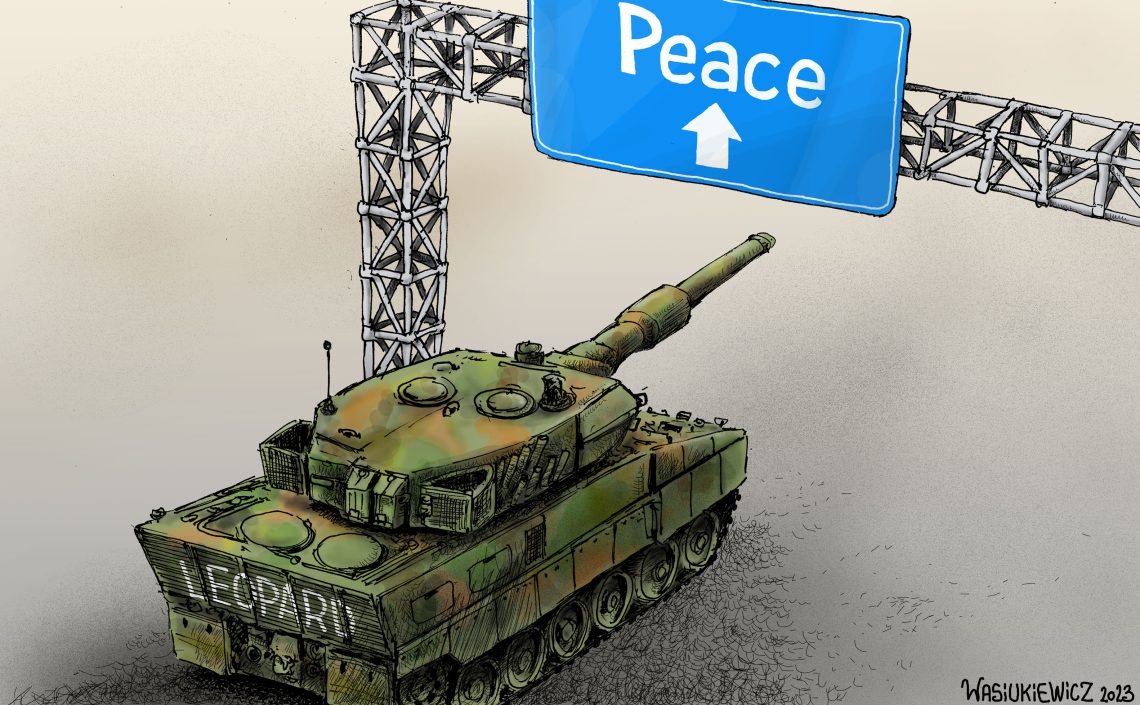After Germany’s indecision, an opportunity for progress
Germany and the U.S. will send offensive weapons to Ukraine. This will give Kyiv a chance to negotiate from a stronger position.

After a lot of discussion, mumbling and hesitation, the German government finally decided to deliver 14 Leopard 2 tanks to Ukraine. This also opens the door to more such tanks being sent from other countries, for example, Poland and Finland.
Why is this so important?
In the medium term, it will be difficult for Ukraine to defend itself, let alone reconquer occupied territories, without offensive military equipment. Modern battle tanks are the most effective offensive weapons. Without any, the Ukrainian army cannot prevent Russia from sending reinforcement, supplies and additional materiel behind the front lines.
The Leopard 2 tank produced by Germany’s Rheinmetall is probably the best main battle tank in the world. In a tank, four characteristics are key: firepower, speed, maneuverability and armor-plating. The Leopard 2 has the optimal combination of all four. It can fire while moving and turning and even hit moving targets with high accuracy. The United States Army also has a very effective main battle tank, the M1 Abrams tank. It has greater firepower, but its armor plating, maneuverability and speed are inferior to the Leopard 2. It also requires extensive training and infrastructure to operate, and it consumes a lot of fuel.
What made the German chancellor suddenly come to a decision?
Since the Russian invasion of Ukraine, Chancellor Scholz has been talking about a Zeitenwende – hinting at a profound change in Europe’s security architecture. Immediately after the invasion, he promised a 100 billion-euro investment in the Bundeswehr. No precise plans were set up.
Unfortunately, the Bundeswehr has an equipment maintenance backlog and does not have enough materiel and insufficient staff. To be fair, defense matters were also neglected by previous governments. Still, Mr. Scholz and his traffic light coalition made fools of themselves. But this is somewhat of a tradition by now. After the occupation of Crimea in 2014, sanctions were issued. I remember very well the speech given by Ursula von der Leyen, the then German minister of defense, at the Munich security conference in 2015. She strongly argued that economic sanctions were so effective that military efforts were not necessary.
It is astonishing that Berlin could not own up to its lack of courage and decisiveness.
At GIS, we have long stated that investing in defense is a more effective and less costly deterrent than sanctions. Defense needs to be credible, and it must be made clear to any potential aggressor that military strength will be used. But now war has broken out already. The long inaction of the present German government had two causes. First, Chancellor Scholz was afraid to alienate its coalition partners. Second, he was wary of acting alone and escalating the conflict. But in fact, this inertia is the best way to make the fighting permanent. In the case of the Leopard tanks, in recent weeks Mr. Scholz declared that he would only move if partners, especially the U.S., would also send some of their Abrams tanks.
At the NATO meeting last week in Ramstein, the brand-new minister of defense had no better excuse to offer than saying that Germany first has to make an inventory of the Leopard tanks. It is astonishing that Berlin could not own up to its lack of courage and decisiveness – or even come up with a more believable excuse.
Berlin finally decided to send tanks, shortly before Washington did. There might be another reason for the chancellor’s change of mind. Chancellor Scholz learned from his predecessor Angela Merkel. The former chancellor’s style was not necessarily to decide what she thought was best for the future of Germany. Rather, her policymaking was determined by whatever the public was feeling. Recent surveys show a shift in public opinion, with more Germans being in favor of sending additional support to Ukraine. The trigger for this change may have been disgust at Russian brutality, a reassessment of the security situation, or embarrassment over the lamentable behavior of the German government.
The reaction in Kyiv was relief. But many also answered that tanks are not enough, requesting additional equipment like fighter planes, missiles and submarines. This is likely a bridge too far. It is necessary not only for Germany but also for NATO and Ukraine to have clear objectives in the deployment of arms.
The good thing is that, despite all the dithering, Ukraine will now receive main battle tanks, both Leopards and Abrams. The best way to end the war is to return to the negotiating table, but Kyiv needs to be in a stronger position. Moscow will only become more reasonable if there are quality offensive weapons on the Ukrainian side. This appears to be the best way forward.
